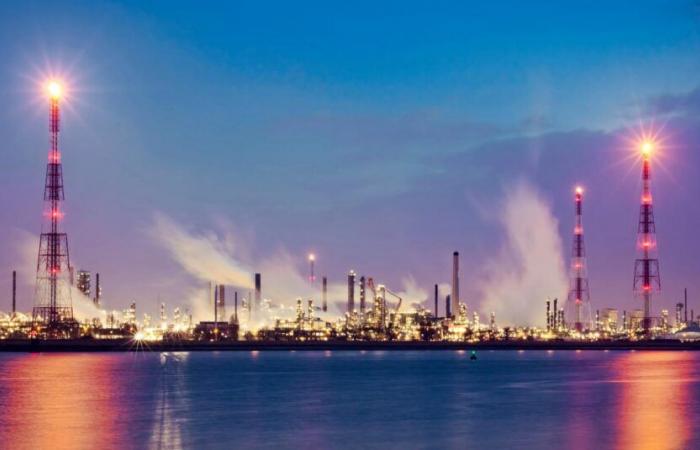What will happen to the TotalEnergies and ExxonMobil refineries in the port of Antwerp if we all go electric by 2050? “If we invest around 20 billion euros, these refineries can continue to play a key role in a climate-neutral economy,” says Wim De Wulf, secretary general of the sector federation Energia.
“’Dad, why are you working for the oil industry?’ This is what my children asked me a few years ago,” remembers Wim De Wulf. Today, our image is improving, because people see that we are participating in the energy transition. For example, with the installation of charging stations at gas stations and increasing the production of advanced biofuels.”
“Our refineries are once again managing to recruit young engineers,” says the secretary general of Energia, which was previously an oil federation. Today we are an industry organization that represents the interests of companies offering various energy solutions for transport, heating and industry. We have 17 members who, with more than 6,000 employees, ensure almost half of the energy supply in Belgium.”
No obsolescence for refineries
The road to absolute zero carbon is still long. Nearly half of Belgium’s energy supply still relies on petroleum products and a quarter on natural gas. Each year, refineries produce 31 million tonnes of petroleum products for a Belgian demand of 24 million tonnes. Foreign trade flows are significant, with exports leaving Antwerp to the southern United States and Singapore. Refineries mainly produce fuels (80%) and raw materials for petrochemicals (20%).
By 2050, the economy should be “climate neutral”. If this is achieved, liquid fuels will still be necessary for transport that is difficult to electrify, such as maritime transport, aviation and heavy road transport. According to a study by Enersangi, commissioned by Energia, the demand for liquid fuels in Belgium will fall by half by 2050. However, it will still amount to eight million tonnes per year. These fuels will obviously have to be 90% zero carbon fuels or with low carbon content. For example, renewable biofuels and synthetic fuels made from green electricity. Refineries could survive if they are able to produce these fuels. “We are a flexible industry. We are used to transforming molecules. The future holds other sustainable raw materials, but the business will remain the same,” says Wim De Wulf.
However, oil remains on the menu. Refineries also produce raw materials for thousands of petrochemical products such as plastics, pharmaceuticals, phones, bicycles, paints and cosmetics. A small half can still be manufactured from fossil molecules, even in 2050. The other half will then have to come from recycled and renewable raw materials. The production of Belgian refineries could increase by half to reach 8 million tonnes per year if they soon meet not 60 but 100% of the demand for raw materials from the petrochemicals of Antwerp, one of the largest hubs world. “There are also export opportunities thanks to scale effects. You also create security of supply for thousands of essential products. Strategic autonomy is a priority on the European agenda,” explains Wim De Wulf.
Necessary investments
The transformation of refineries requires heavy investments. “We need around 20 billion euros until 2050, without taking into account the production of green hydrogen and electricity. For comparison, we have invested two to three billion in refineries over the last 10 years. De facto, we are talking about the equivalent of almost two new refineries. TotalEnergies built a new $10 billion refinery in Saudi Arabia 10 years ago,” explains Wim De Wulf.
Will the parent companies of TotalEnergies and Exxon Mobil inject 20 billion euros into their Antwerp factories? Investments could also be aimed at the United States, Asia or the Middle East. “Investments in Europe are currently on hold,” says Wim De Wulf. We need a stable and well-thought-out legal framework in Europe, because in the absence of economic growth there is no room for political mistakes. This framework must also be competitive compared to the United States, for example. The latter roll out the red carpet for investors thanks to generous subsidies and a simple regulatory framework. China has overcapacity and sends us cheap products. Europe is suffering from high energy prices. The European Commission is proposing the Industrial Green Deal in spring 2025. Its content will be extremely important for investment decisions.”
We are used to transforming molecules. The future holds other sustainable raw materials, but the business will remain the same.
The main advantage of the Antwerp refineries is that they already exist, are efficient and ideally located near the port, and that they have a large petrochemical center as a neighbor. But if refineries did not yet exist, would they be built today? “Good question,” replies Wim De Wulf. At present the situation is very uncertain. Hence the importance of the European industrial agreement. TotalEnergies transformed small refineries in France into biorefineries and built a new refinery in Saudi Arabia. If European demand for liquid fuels halves, half of Europe’s refining capacity will disappear. The winners will be refineries that have invested in new technologies in the past. This is the case for the two Antwerp refineries. They are eligible for investments in favor of the energy transition. Gunvor closed its Antwerp refinery in 2020. The company had not invested enough in the past, given its more limited size,” explains Wim De Wulf.
“Investment risk can be reduced if the government puts in place intelligent financial support,” continues the secretary general of Energia. We invest in refineries to reduce carbon emissions from production and fuels. These investments are profitable if the price of carbon is high enough. One proposal is for the government to step in if the carbon price falls below a certain value, and for us to pay the government if the carbon price rises above that value. Flanders can implement this financial instrument. It also appears in the Flemish coalition agreement.”
Belgium could produce up to 40% of its fuel needs for road transport on its soil by 2050.

The transition has begun
Meanwhile, the energy transition has already begun. Biofuels are already mixed with fossil fuels. Furthermore, there is a second generation of biofuels that can replace diesel and reduce emissions by up to 90%. “These fuels are even more expensive than conventional diesel, but companies are already choosing them knowingly,” explains Wim De Wulf. McDonald’s uses HVO (hydrogenated vegetable oil, editor’s note) for its truck fleet. The price difference will decrease in the future, in particular due to increased taxes on fossil fuels. We recommend lowering excise duties based on the capacity of biofuels intended to reduce CO emissions2.”
By 2035, new cars in the European Union must be carbon neutral. Will they all be electric? Or will biofuels still take a solid market share? “In 2035, thermal engines will probably still represent 70% of the automobile fleet, thinks Wim De Wulf. We advocate technological neutrality in the transition. We need to impose emissions targets, but let the market decide whether it wants electric cars or other propulsion technology. We used life cycle analysis instead of only considering emissions. A car running on advanced biofuels has lower net carbon emissions than an electric car. In addition, Europe has numerous biofuels from household, agricultural and forestry waste. So we are not burning potential food. Belgium could produce up to 40% of its fuel needs for road transport on its soil by 2050. This could increase our energy independence.”







